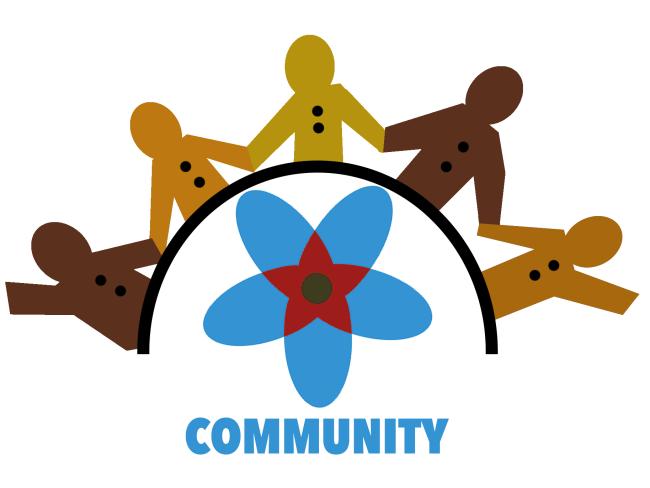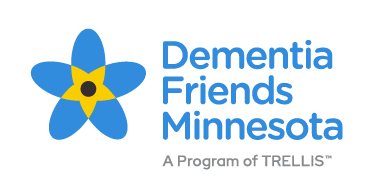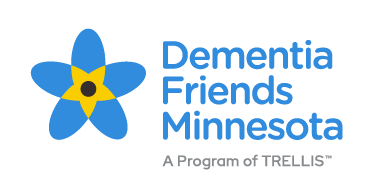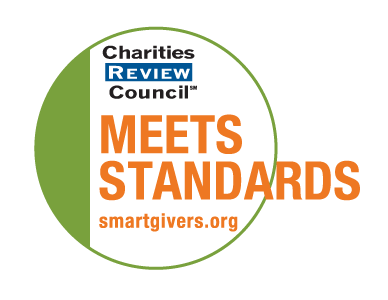Dementia Friends Interview: Sister Margaret Belanger

To celebrate the tenth anniversary of Dementia Friends Minnesota, every month we will be featuring a Friend who has taken the work to new heights. This month, we spoke to Sister Margaret Belanger, Sister of St. Joseph and resident at Carondelet Village who created Living Room Conversations with another resident to share the Dementia Friends message.
This month the logo was reimagined by Suzanne Herder, Sister of St. Joseph of the St. Paul Province. She teaches art classes for the residents at Carondelet Village where she lives. She also spends time with several of her friends at Carondelet Village who have Dementia. Suzanne has also taught art classes at a shelter in Mexicali, Mexico. The children and adults she teaches at the shelter are waiting for sponsors so they may cross into the U.S.
How did you get involved in this work?
My introduction to Dementia Friends came through the consortium grant at Carondelet Village, which is a partnership of Presbyterian Homes and the Sisters of Saint Joseph. When we were planning this facility, the Department of Health was offering these consortium grants and the purpose of those was to see if it was possible for organizations in the same locality to work together non-competitively, collaboratively, without threatening any one entity's mission or activities or fund sources. The initial part of the grant was simply identifying all the organizations in this Highland, Groveland, Union Hill area, those districts in St. Paul. We had 20 or 25 different organizations all working with seniors in this area, all siloed, each one independent of the others. We hosted a couple open houses and for the first year, it was a matter of just sharing who everyone was, where they worked, where they were putting their major energies and trying to figure out a common area that we could work on collaboratively. Dementia became the area for SPN-ACT (St. Paul Neighborhood ACT on Alzheimer’s Action Team). Everybody understood the issue of dementia. Everybody was struggling with that issue. The services were few to none for most. Then we had to select a focus area. And after a lot of conversation, it came down to education and awareness for people in the community, not caregivers but the banks, the beauty salons, the grocery stores and where these people came in. How do you interact with people with dementia? And that’s where Dementia Friends came in.
How does Dementia Friends work in your community?
When we started, Dementia Friends had a guide sheet with goals, objectives; do this, do this, do this. Those sheets worked to train people, staff, families, but in a senior facility what we realized is that hearing is a big issue. And in larger groups, it's harder for people to hear and then they struggle with things like - I want to know what that small group said, but I'm in this group. So, Joan Whitman, who's a resident here, and I started having what we called “Living Room Conversations.” We rotated between our two apartments. We limited it to six people because that's the best number where people could fit and be heard. We followed the guidelines, but we didn't do them in a teacher or workshop mode. We just let the conversation emerge and followed it, then we would bring it back as needed and at the appropriate time. The conversations were from the sublime to the ridiculous. They were heart wrenching because people were pretty open about their experiences. Some of them had spouses with them who had dementia. Some were widows whose spouses had dementia and had died. There was a lot of sharing of the actual reality. This isn't just what's coming from a guide sheet or a textbook, but this is what my life experience was. You never knew what was going to happen, but you knew whatever it was, it was going to be good.
What did the Living Room Conversations lead to at Carondelet?
About five years ago, we heard about the Memory Café in Roseville and how effective it was. We had conversations about how we can do that here in the village and the community around us? So, we started a Memory Café, and we had a diverse group of participants. There were couples, caregivers and people with dementia. We had those whose partner had passed, and they were coming for support. In the course of the Memory Café, some experienced the death of their spouse and so we had them before and then after that experience. We have had some wonderful moments in the café. One of the examples was this couple, they both had dementia, but she was in the very early stage. He was a little further along. She asked the group, how do you tell your children? Others who had children opened up to them and said, "Well this is what we did or this is what we didn't do, or in hindsight this would have helped." People started brainstorming, "Could you try this or what about that?" We had another experience where the lady and her partner came, and she had just been diagnosed the week before. She was angry. The partner who was with her just let her vent and she did. She let it all out and she had people crying in the room and some of us wondering - what do we do? But we let her go. In the end she acknowledged her anger and said, "I'm trying to cope and trying to learn what to do." She thanked us for listening.
We've always said, come as you are. This is who you are today and that's who we want to be with today. There's a total acceptance and the understanding that whatever happens in this group stays in this group. So, from Living Room Conversations to the Memory Café, that's the evolution. And we're not sure what it's going to be like in the days ahead, but we try to stay open, to embrace folks where they are, to feed them resources, and make them aware of information.
What advice do you have for other people who want to create more dementia friendly experiences in their senior living community?
Once you understand Dementia Friends, feel free to adapt it. Be flexible and reassuring to participants that as a group, you're safe here. With Memory Cafés, which we moved to five years ago, we welcome you as you are. Bring your companion, partner, spouse, whoever it is. Both of you can have this experience together. We have a couple with us right now and she said the Memory Café is something we can do together. There are not many activities you can share. Be alert, not just to those with dementia, but you might have people in your facility who are alone with and need companionship, or they just need a place to go and be with people.



